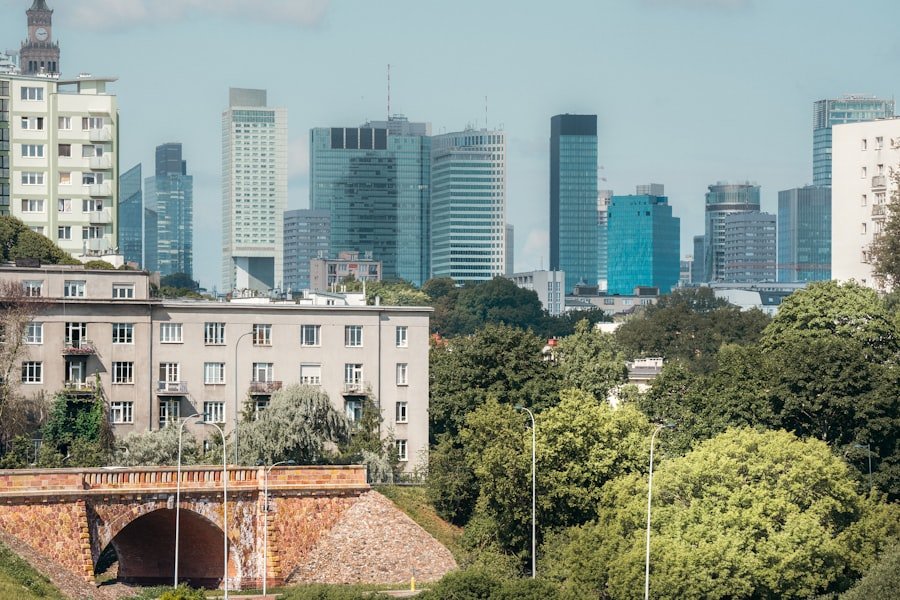Sustainable urban development is an approach that seeks to create urban environments that are not only economically viable but also socially inclusive and environmentally responsible. As the global population continues to migrate towards urban areas, the need for sustainable practices in city planning and development has become increasingly urgent. Urban centres are often the epicentres of economic activity, cultural exchange, and innovation; however, they also face significant challenges such as pollution, resource depletion, and social inequality.
The concept of sustainable urban development aims to address these issues by integrating ecological principles into the fabric of urban life. At its core, sustainable urban development is about creating cities that can thrive in harmony with their natural surroundings. This involves a holistic approach that considers the interconnections between various urban systems, including transportation, housing, energy, and waste management.
By prioritising sustainability in urban planning, cities can enhance their resilience against climate change, improve the quality of life for their residents, and ensure that future generations inherit a livable environment. The transition towards sustainable urban development is not merely a trend; it is a necessity for fostering long-term urban resilience and sustainability.
Summary
- Sustainable urban development aims to create cities that are environmentally friendly, socially inclusive, and economically viable.
- Benefits of sustainable urban development include improved public health, reduced pollution, and increased resilience to climate change.
- Principles of sustainable urban development include compact and mixed land use, efficient transportation, and green infrastructure.
- Challenges of implementing sustainable urban development include lack of political will, financial constraints, and resistance to change.
- Examples of successful sustainable urban development projects include the Vauban district in Freiburg, Germany, and the Masdar City in Abu Dhabi, UAE.
Benefits of Sustainable Urban Development
The benefits of sustainable urban development are manifold and extend across various dimensions of urban life. One of the most significant advantages is the enhancement of environmental quality. By implementing green infrastructure, such as parks, green roofs, and permeable pavements, cities can mitigate the effects of urban heat islands, improve air quality, and manage stormwater more effectively.
For instance, cities like Singapore have integrated extensive greenery into their urban landscape, which has not only beautified the city but also contributed to biodiversity and improved residents’ well-being. Another critical benefit is the promotion of social equity. Sustainable urban development prioritises inclusivity by ensuring that all community members have access to essential services, public spaces, and economic opportunities.
This can be achieved through mixed-use developments that combine residential, commercial, and recreational spaces, thereby fostering vibrant communities. For example, the redevelopment of the King’s Cross area in London has transformed a previously neglected industrial site into a thriving mixed-use neighbourhood that offers affordable housing alongside cultural and recreational amenities. Such developments not only enhance the quality of life for residents but also stimulate local economies.
Principles of Sustainable Urban Development

The principles of sustainable urban development are grounded in the idea of balancing economic growth with environmental stewardship and social equity. One fundamental principle is the concept of compact city design, which advocates for higher density living to reduce land consumption and promote efficient public transport systems. By concentrating development in urban cores rather than sprawling into surrounding areas, cities can minimise their ecological footprint while enhancing accessibility to services and amenities.
Another key principle is the integration of renewable energy sources into urban infrastructure. Cities can significantly reduce their carbon emissions by harnessing solar, wind, and geothermal energy. For instance, Freiburg in Germany has become a model for sustainable energy use by investing in solar power and promoting energy-efficient buildings.
The city’s commitment to sustainability has not only reduced its reliance on fossil fuels but has also created jobs in the renewable energy sector, demonstrating that environmental responsibility can go hand in hand with economic growth.
Challenges of Implementing Sustainable Urban Development
Despite the clear benefits and principles associated with sustainable urban development, numerous challenges hinder its widespread implementation. One significant obstacle is the existing regulatory framework that often prioritises short-term economic gains over long-term sustainability goals. Many cities are bound by outdated zoning laws and building codes that do not accommodate innovative sustainable practices.
This regulatory inertia can stifle creativity and limit the potential for transformative projects that could enhance urban sustainability. Additionally, financial constraints pose a considerable challenge to implementing sustainable initiatives. Many local governments struggle with budget limitations that prevent them from investing in necessary infrastructure upgrades or green technologies.
The initial costs associated with sustainable development projects can be daunting; however, it is essential to recognise that these investments often yield long-term savings through reduced energy consumption and improved public health outcomes. Overcoming these financial barriers requires innovative funding mechanisms, such as public-private partnerships or green bonds, which can mobilise resources for sustainable urban initiatives.
Examples of Successful Sustainable Urban Development Projects
Several cities around the world have successfully implemented sustainable urban development projects that serve as inspiring examples for others to follow. One notable case is Copenhagen, Denmark, which has set ambitious goals to become carbon neutral by 2025. The city has invested heavily in cycling infrastructure, making it one of the most bike-friendly cities globally.
With over 60% of residents commuting by bicycle daily, Copenhagen has significantly reduced traffic congestion and air pollution while promoting a healthier lifestyle among its citizens. Another exemplary project is the Eco-City initiative in Tianjin, China. This ambitious project aims to create a model for sustainable living by integrating green technologies into urban design.
The Eco-City features energy-efficient buildings, extensive green spaces, and a comprehensive public transport system that reduces reliance on cars. By prioritising sustainability from the outset, Tianjin’s Eco-City serves as a blueprint for future urban developments in rapidly growing regions.
Strategies for Achieving Sustainable Urban Development

To achieve sustainable urban development effectively, a multifaceted approach is necessary. One strategy involves fostering collaboration among various stakeholders, including government agencies, private sector actors, non-profit organisations, and community members. Engaging these diverse groups in the planning process ensures that multiple perspectives are considered and that solutions are tailored to meet local needs.
For instance, participatory planning workshops can empower residents to voice their concerns and contribute ideas for sustainable initiatives in their neighbourhoods. Another critical strategy is leveraging technology to enhance urban sustainability. Smart city technologies can optimise resource management by using data analytics to monitor energy consumption, traffic patterns, and waste generation.
Cities like Barcelona have implemented smart sensors to manage street lighting and waste collection more efficiently, resulting in reduced energy use and improved service delivery. By embracing technological innovations, cities can streamline operations while minimising their environmental impact.
Role of Community Participation in Sustainable Urban Development
Community participation plays a pivotal role in the success of sustainable urban development initiatives. Engaging residents in decision-making processes fosters a sense of ownership and accountability towards local projects. When communities are actively involved in shaping their environments, they are more likely to support sustainability efforts and contribute to their success.
For example, community-led initiatives such as urban gardening projects not only enhance local food security but also strengthen social ties among residents. Moreover, community participation can lead to more equitable outcomes in urban development. By ensuring that marginalised voices are heard in planning discussions, cities can address historical injustices and create inclusive spaces that cater to diverse populations.
Initiatives like participatory budgeting allow residents to allocate funds towards projects that directly benefit their communities, thereby empowering them to take an active role in shaping their urban landscape.
The Future of Sustainable Urban Development
The future of sustainable urban development hinges on our ability to adapt to changing circumstances while remaining committed to ecological integrity and social equity. As cities continue to grow and evolve, embracing innovative practices will be essential for addressing pressing challenges such as climate change and resource scarcity. The integration of sustainability into urban planning must become a fundamental aspect of how we envision our cities moving forward.
In this context, collaboration among stakeholders will be crucial for fostering resilience and adaptability in urban environments. By harnessing technology and prioritising community engagement, cities can create inclusive spaces that reflect the needs and aspirations of their residents while safeguarding the planet’s resources for future generations. The journey towards sustainable urban development is complex but necessary; it requires collective action and a shared vision for a more equitable and environmentally responsible future.
Sustainable urban development is crucial for creating environmentally friendly and socially inclusive cities. One related article that highlights the importance of long-term maintenance in sustaining a classic brand name can be found here. This article discusses how consistent upkeep and innovation are essential for maintaining a brand’s relevance and success in the market. Additionally, investing in renewable energy solutions like the Tesla Powerwall, as discussed in this article, can contribute to sustainable urban development by reducing carbon emissions and promoting energy efficiency. Furthermore, training to become a coach, as explored in this article, can offer individuals a rewarding new career path focused on personal development and empowerment within urban communities.
FAQs
What is sustainable urban development?
Sustainable urban development refers to the planning and management of cities and towns in a way that promotes economic growth, social inclusion, and environmental sustainability. It aims to create cities that are resilient, resource-efficient, and provide a high quality of life for their residents.
What are the key principles of sustainable urban development?
The key principles of sustainable urban development include promoting compact and mixed-use development, improving public transportation and infrastructure, preserving green spaces, promoting energy efficiency and renewable energy, and fostering social inclusion and community engagement.
Why is sustainable urban development important?
Sustainable urban development is important because it helps to address the challenges of rapid urbanization, such as congestion, pollution, and social inequality. It also contributes to the overall well-being of urban residents and helps to mitigate the impacts of climate change.
What are some examples of sustainable urban development initiatives?
Examples of sustainable urban development initiatives include the development of eco-friendly buildings, the implementation of bike-sharing programs, the creation of pedestrian-friendly streets, the promotion of urban agriculture, and the establishment of green building standards and certifications.
How can individuals contribute to sustainable urban development?
Individuals can contribute to sustainable urban development by using public transportation, walking or cycling instead of driving, conserving energy and water, supporting local businesses, participating in community initiatives, and advocating for sustainable urban policies and practices.
